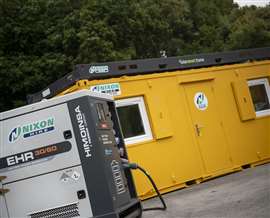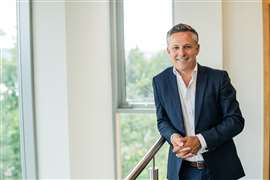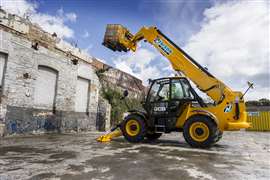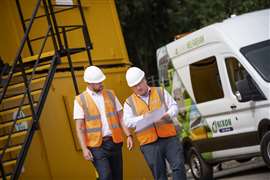Interview: How Nixon Hire aims to become a sustainability specialist
02 December 2024
While its roots are in plant-hire, Nixon Hire is reinventing itself as a specialist supplier of equipment for “sustainable sites”. CEO Graham Nixon explains why.
 The company has invested £15 million over the course of the last three years on solar and hybrid products. (All photos courtesy of Nixon Hire)
The company has invested £15 million over the course of the last three years on solar and hybrid products. (All photos courtesy of Nixon Hire)
Founded in 1967, UK-based Nixon Hire has built its reputation around being a generalist rental company.
However, the Newcastle-headquartered company, founded by John Nixon and led by his son Graham since 2013, has been on somewhat of a reimagining of its roots in recent years.
Firstly, it created a renewables division covering generators, welfare units, lights and power accessories in the hybrid and solar range.
Secondly, it has been able to accelerate its growth plans following investment from Pricoa Private Capital, a division of life assurance firm Prudential Financial, Inc.
Following the investment from Pricoa, which holds a minority stake, it carried out an analysis of its operations, as Graham Nixon tells IRN; “We’ve been analysing the business and since then (the investment) we’ve come out of Covid, Brexit and faced inflation.
“It’s been very challenging, but the most enlightening time is setting yourself a new vision, which is what the last 12 month has all been about.”
The vision he references will certainly set the company on a new course, veering from its traditional plant hire offering to become a specialist supplier of equipment for “sustainable sites.”
Nixon’s move towards specialist rental
The strategy will see the company focus on portable accommodation and renewable power, alongside site welfare and portable toilets, for construction, events and other projects.
 Graham Nixon has led the family-owned company since 2013.
Graham Nixon has led the family-owned company since 2013.
At the time of the announcement, the company said the shift will allow it to invest in its “strongest areas of differentiation with the most compelling growth opportunities.”
And, although just announced, Nixon says the move has been under consideration from the company some time.
In fact, the very early beginnings can be traced back to 2019, when the company acquired the Elliot Loohire business from Elliot.
This, says Nixon, enabled it to have an immediate impact in the south and also acted as a trial to run a network of depots without large plant.
Since then, the company has consolidated some of the depots into its Bedford operation, its largest depot that offers site accommodation, renewables and welfare units.
Nixon says the depots have flourished in that time; “It quickly become our most profitable depot, producing the most EBITDA of the whole network, so it kind of raised our eyebrows a little bit,” Nixon says when asked about the process of focusing on specialist rental.
“When it was a family business, we were very much a generalist rental company. We hired anything from small plant to large plant, to cabins.
“Was it always in our vision? No, it wasn’t because we were a generalist, but as you go through your business cycle through different markets, you’re always looking at the future, looking at what you have already, and can you make it better?”
Part of this commitment to refine operations and lean into its strengths saw Nixon sell off its entire fleet of larger, traditional plant hire equipment in July this year.
Nixon says this was one of the most difficult decisions, as the company had created a legacy in large plant that went back to when his father started the business.
However, the company will still offer large plant through rehire agreements, which Nixon says is another factor that has enabled the company to go down this route.
He points out that many UK-based rental companies rent to each other, meaning that although it won’t offer its own fleet of plant, it will still be able to offer it to customers through these partnerships, something that is less common in Europe.
This also enables Nixon to rely on a “very rigid supply chain” to still offer customers plant equipment when needed, alongside its now core offering of renewable and site accommodation fleet.
He adds that the decision to rehire predates the move into specialty, and it was actually a recession that pushed the company to initially adopt the model; “You’re fighting utilisation and you’re trying to maximise your fleet. So, we opened up a rehire model.”
Sustainability and the energy transition
The interesting thing about speaking to Nixon, and indeed many others within the company from previous visits to its Bedford depot, is that the attitude towards the energy transition is perhaps against the grain of seeing it as a challenge.
Instead, the culture of the company seems to be one in which it views the energy transition as one of its greatest opportunities to differentiate itself among competitors.
In the sustainability game, the company certainly sees itself as the exception to the rule, Nixon says.
 The company sold off its large plant earlier this year.
The company sold off its large plant earlier this year.
In recent years it has been one of the biggest investors in the UK in that respect, with the company investing £15 million over the course of the last three years on solar and hybrid products.
“The new strategic direction has been underpinned by our commitment to sustainable innovation in itself,” he says.
“We’re supplying site accommodation and modular buildings that need power, we could have easily just bought a generator company or put diesel generators out on our hire fleet but that’s evolving and changing.
“We wanted to go in there and say ‘no’, we are going solar products, hybrid generators, and our renewable power offering is all about that we don’t have a hire fleet of diesel generators, everything’s got either solar attached to it. We do solar toilets and solar welfare cabins. We are changing as fast as technology changes. We’re investing heavily into that sector.”
The end goal for Nixon is to be the “experts in sustainable sites,” which he says has been timed perfectly with the UK government’s plans and the markets carbon and ESG goals in the UK.
Project focus
As well as being focused on sustainability, the move has also created a shift in mindset from the company, moving away from just serving customers with equipment and now treating each enquiry as a project.
This is linked to its Depot to Depot (D2D) concept, meaning each depot manager will liaise with customers on an ongoing basis to determine which units they need on site.
With the D2D strategy, Nixon Hire now has what it describes as “renewables excellence hubs” down the spine of the UK in Glasgow, Newcastle, Castleford and Bedford.
As part of that new format, Nixon says the company has “upped the management” so each of the depots has a dedicated renewables power manager, backed up by its technical team that visit sites and install its renewable offerings.
He calls this “the new Nixon”, underpinned by the experts it has brought in (see box story) to lead the next phase and says that the company now has the “strongest board I’ve worked with.”
“What we’re doing, which is very different, is taking the customers enquiry, we’re then grabbing that and talking to the customer and then delivering the cabins, the renewable products and the power and we’re then backing up with the data.
“It’s not just delivering the units and then off you go and we walk away. We’re actually working hand in hand with the customer on their journey”
Meanwhile, a team at its HQ, which he describes as “mission control” constantly monitors daily usage of equipment through telematics, enabling the company to highlight error codes and power consumption in real time and control its units remotely if needed.
In the case of its modular buildings division, a “bespoke team” will take the lead on project management discussions with customers.
“That has been a massive change,” he says when asked about the changing mindset within the company. “That’s a change from a typical sales guy who is very hire rate orientated. We’ve now changed into much more project management, like an expert to get the confidence and the trust between the customer, and it’s reaping dividends for us.
“We’re setting up a site set up for them that could be on site for the next three of four years, so you build a great partnership from the start and trust is a massive thing with the customer.”
Impact on CapEx
Another impact will be on its CapEx. Last year Nixon spent £46 million on fleet, having generated turnover of around £100 million.
The company is forecasting for next year at the time of writing, but he expects that to drop to somewhere around the £20 million mark, or just over.
“Large Plant is heavy on maintenance CapEX, purchasing large quantities of new machines each year to replace older models. The sale of our Large Plant fleet allows us to fund future investment in the key growth areas of Site Accommodation, Modular Buildings and Renewable power products,” he says. “This will improve the financial profile of the business while unlocking substantial growth opportunities.”
The next step will be to invest into the modular building division, which to date has seen roughly £4 million in investment; “We’ve always touched on modular buildings, but we’ve rehired it. We’re now buying the assets ourselves. The problem with modular buildings is the lead time to get them.
“So, we’ve invested quite a lot in just getting stock, getting the product in so we have we have a continuous stock coming into the business to support our very strong pipeline in modular buildings.”
 Nixon says the move has created a shift in mindset within the company.
Nixon says the move has created a shift in mindset within the company.
Next year, CapEx on modular buildings is expected to be around £5 million, he says.
The future
Of course, while such drastic change in a company’s operations would usually spark some form of apprehension, Nixon remains confident that the future looks bright.
He says, “It’s a bold move to make, but I’ve been in the in this business for 36 years and we have done a lot of change and sometimes so much change that it worries me that we’ve done too much, but we’ve managed it very, very carefully this year.”
He adds that the “outlook is very exciting for us” with “a lot of things that are switching on at the minute and we’ve got a very clear vision going forward.”
Next on the agenda will be to expand its depot network, a process that started at the back end of 2023, adding to its existing network of 14 depots across the UK.
While still early days for any exclusives, he does reveal that he expects at least three next year, with some potential for news coming in Q1.
In terms of placement, the immediate plan is to open new depots further south than London to effectively cover the south coast.
“We still feel we’ve got plenty of room to grow in the south,” he says. “Our furthest depot south is in Essex, but we’re looking at the south west and south east to achieve our vision.”
However, he admits that the move away from large plant means that the company’s dependence on a vast depot network is reduced, as site accommodation and modular buildings can be achieved with “couple of depots.”
So, while the “The New Nixon” may be the headline many take from this, it seems that the move to become a specialist is just the start for the company on its reinvention journey. With that, perhaps a more appropriate headline would be “the next phase for Nixon.”
The team behind the new Nixon Hire
 From left to right: Andy Gordon, Paul Corney, Andrew Shaw and Brian Cornett. Photo: Nixon Hire
From left to right: Andy Gordon, Paul Corney, Andrew Shaw and Brian Cornett. Photo: Nixon Hire
The team behind the new Nixon compiles of a range of experts in the modular building and renewables fields respectively.
Brian Cornett, previously UK operations director at Cross Rental Services and co-founder of Speedy Hire’s power division, joined as chief operating officer in May this year.
Meanwhile, Andrew Shaw joined in March as the head of the modular buildings division that it created earlier this year.
Shaw brings over 14 years of experience to the role and was previously the business development manager at Sibcas, head of business development at Thurston Group and field sales manager at Algeco, part of the global Modulaire portable accommodation business.
Simon Gibbs, previously with Hybrid Power Hire and Speedy Hire, leads the renewable power division.
Andy Gordon joined the company in May as technical sales director of its renewables division. Nixon said Gordon, former head of electrical services for Sunbelt Rentals, will be responsible for managing, growing and upskilling the renewable power sales team as well as ensuring products are installed efficiently and accurately.
Finally, Paul Corney, who joined the company in 2015 as rehire manager, takes on the role of head of central revenue generation & rehire.
STAY CONNECTED



Receive the information you need when you need it through our world-leading magazines, newsletters and daily briefings.
CONNECT WITH THE TEAM







